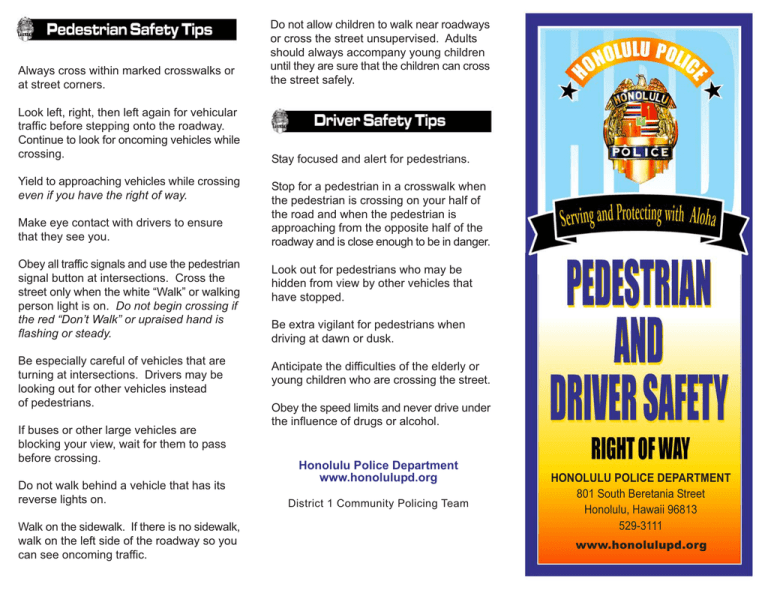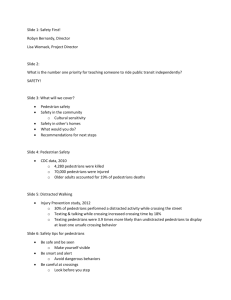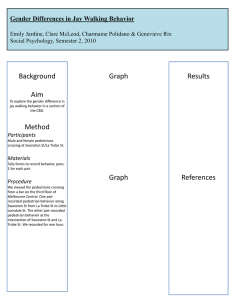brochure in PDF - Honolulu Police Department
advertisement

Always cross within marked crosswalks or at street corners. Do not allow children to walk near roadways or cross the street unsupervised. Adults should always accompany young children until they are sure that the children can cross the street safely. Look left, right, then left again for vehicular traffic before stepping onto the roadway. Continue to look for oncoming vehicles while crossing. Stay focused and alert for pedestrians. Yield to approaching vehicles while crossing even if you have the right of way. Make eye contact with drivers to ensure that they see you. Stop for a pedestrian in a crosswalk when the pedestrian is crossing on your half of the road and when the pedestrian is approaching from the opposite half of the roadway and is close enough to be in danger. Obey all traffic signals and use the pedestrian signal button at intersections. Cross the street only when the white “Walk” or walking person light is on. Do not begin crossing if the red “Don’t Walk” or upraised hand is flashing or steady. Look out for pedestrians who may be hidden from view by other vehicles that have stopped. Be especially careful of vehicles that are turning at intersections. Drivers may be looking out for other vehicles instead of pedestrians. Anticipate the difficulties of the elderly or young children who are crossing the street. If buses or other large vehicles are blocking your view, wait for them to pass before crossing. Do not walk behind a vehicle that has its reverse lights on. Walk on the sidewalk. If there is no sidewalk, walk on the left side of the roadway so you can see oncoming traffic. Be extra vigilant for pedestrians when driving at dawn or dusk. Obey the speed limits and never drive under the influence of drugs or alcohol. Honolulu Police Department www.honolulupd.org District 1 Community Policing Team HONOLULU POLICE DEPARTMENT 801 South Beretania Street Honolulu, Hawaii 96813 529-3111 www.honolulupd.org Pedestrian Fatalities More than 20 pedestrians die on Oahu roadways each year. An additional 400 to 500 pedestrians are injured each year. Per capita, Hawaii has the 4th highest pedestrian fatality rate in the United States. The majority of fatalities occurred when people failed to use crosswalks or did not cross at intersections. Pedestrians were also struck when drivers failed to yield the right-of-way or were inattentive. The Honolulu Police Department is committed to safeguarding and protecting our community, but we can't do it alone. We need your help. Pedestrian safety is one of our priorities. The damaging effects of collisions are not limited to victims but also include their families, friends, and even the driver. Under the current law, if a driver does not yield the right-of-way to pedestrians in a crosswalk or pedestrians who are crossing the street, the driver may be fined. Taking basic precautions, such as being alert and mindful of your surroundings, minimize your chances of becoming a victim. This pamphlet is intended to educate you on the dangers of jaywalking and on how to ensure your safety on our roadways. Please take the time to read these tips and share them with your families and friends. Most of all, remember to obey traffic laws at all times whether you are crossing the street or driving. With your help, we can make our community a safer and more enjoyable place to live. O ff i c e r P u e o Crime Fighting Owl What is Jaywalking? Jaywalking is crossing the street outside of a crosswalk or away from a street corner. Traffic collisions can be prevented. The responsibility for improving safety on our roadways lies with all pedestrians and motorists. Some people feel that it is inconvenient to use a marked crosswalk or to walk to the corner to cross the street. Some are in a rush and think that they can get across the street before the approaching vehicle reaches them. They assume that once they’re on the roadway, the vehicle will see them and stop. Others assume that jaywalking is allowed because they see other people doing it. But it isn't. Jaywalking is against the law and punishable by a fine. PDF 9/09

